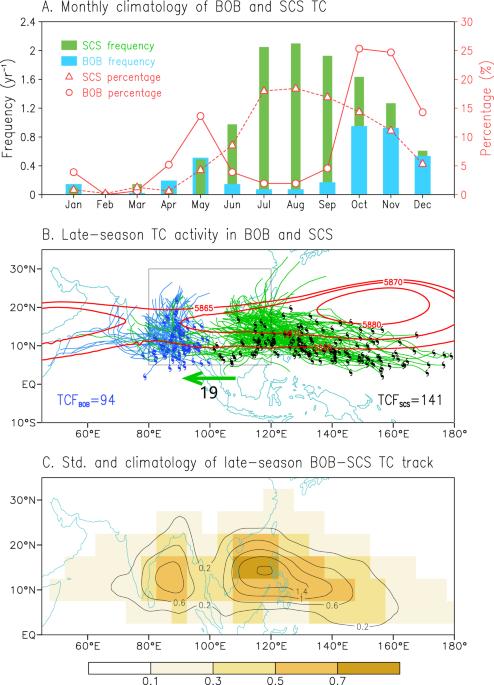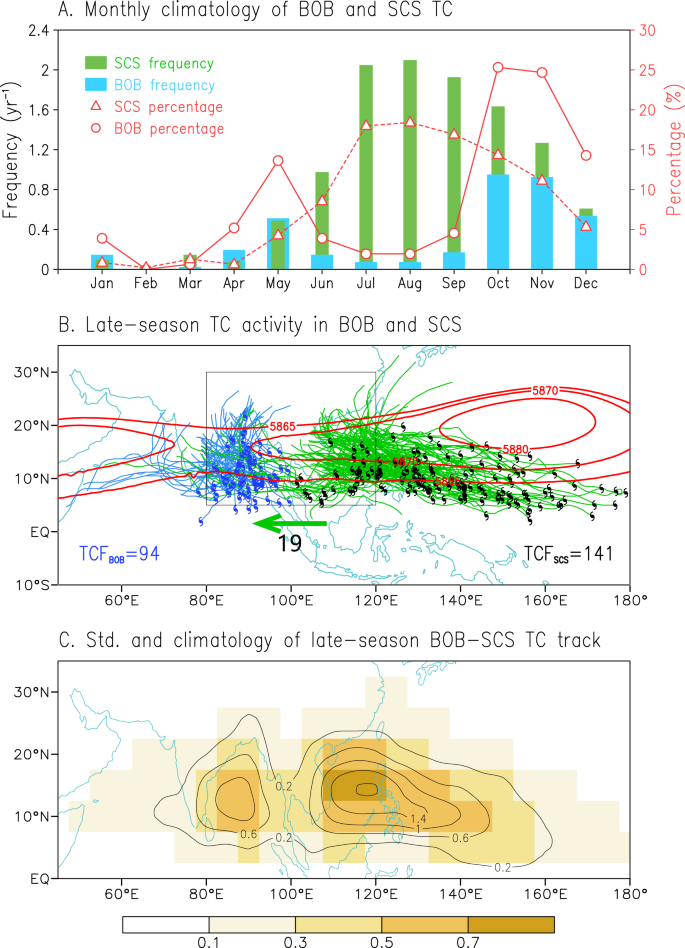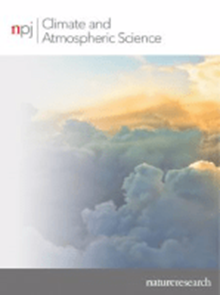Unraveling the strong covariability of tropical cyclone activity between the Bay of Bengal and the South China Sea
IF 8.5
1区 地球科学
Q1 METEOROLOGY & ATMOSPHERIC SCIENCES
引用次数: 0
Abstract
Herein, we report a strong in-phase covariability of tropical cyclone (TC) activity between the Bay of Bengal (BOB) and the South China Sea (SCS) during October–December of 1979–2019, and which is also the dominant mode of BOB–SCS TC activity, accounting for 35% of the total variances in TC track density. This inter-basin TC covariance is closely linked to the anomalies of tropical sea surface temperature, appearing as the intrinsic Indo-Pacific Tripole mode, which significantly affects the atmospheric circulations overlying the BOB–SCS. Interestingly, this mechanism works via modulating the local TC genesis frequency in the BOB–SCS. However, in terms of the migrated TCs among them, the Indo-Pacific Tripole mainly regulates their genesis location but not their frequency. More importantly, such inter-basin TC covariability still exists significantly even when the TC track data migrating from the SCS into the BOB are excluded. After all, only 19 TCs during the 41 years (1979–2019) are observed to migrate from the SCS to the BOB, which can only contribute slightly to increasing the covariability of BOB–SCS TC-track activity, but do not play a dominant role. Further, the numerical simulations suggest that although both the Indian and Pacific Oceans contribute to the atmospheric anomalies that affect the BOB–SCS TC activity, the Pacific-effect is twice as important.


孟加拉湾与南海热带气旋活动的强协变性研究
在此,我们报告了1979年至2019年10月至12月孟加拉湾(BOB)和南海(SCS)之间热带气旋(TC)活动的强同相协变性,这也是BOB-南海热带气旋活动的主导模式,占TC轨道密度总方差的35%。这种盆地间TC协方差与热带海面温度异常密切相关,表现为固有的印度-太平洋Tripole模式,对BOB–SCS上的大气环流产生了显著影响。有趣的是,这种机制通过调节BOB-SCS中的局部TC发生频率而起作用。然而,就迁移的TC而言,印度-太平洋Tripole主要调节其发生位置,而不是频率。更重要的是,即使排除了从SCS迁移到BOB的TC轨道数据,这种盆地间TC协变性仍然显著存在。毕竟,在41年(1979–2019)中,只有19个TC从SCS迁移到BOB,这只能略微增加BOB–SCS TC轨道活动的协变性,但不能发挥主导作用。此外,数值模拟表明,尽管印度洋和太平洋都对影响BOB-SCS TC活动的大气异常有贡献,但太平洋效应的重要性是其两倍。
本文章由计算机程序翻译,如有差异,请以英文原文为准。
求助全文
约1分钟内获得全文
求助全文
来源期刊

npj Climate and Atmospheric Science
Earth and Planetary Sciences-Atmospheric Science
CiteScore
8.80
自引率
3.30%
发文量
87
审稿时长
21 weeks
期刊介绍:
npj Climate and Atmospheric Science is an open-access journal encompassing the relevant physical, chemical, and biological aspects of atmospheric and climate science. The journal places particular emphasis on regional studies that unveil new insights into specific localities, including examinations of local atmospheric composition, such as aerosols.
The range of topics covered by the journal includes climate dynamics, climate variability, weather and climate prediction, climate change, ocean dynamics, weather extremes, air pollution, atmospheric chemistry (including aerosols), the hydrological cycle, and atmosphere–ocean and atmosphere–land interactions. The journal welcomes studies employing a diverse array of methods, including numerical and statistical modeling, the development and application of in situ observational techniques, remote sensing, and the development or evaluation of new reanalyses.
 求助内容:
求助内容: 应助结果提醒方式:
应助结果提醒方式:


